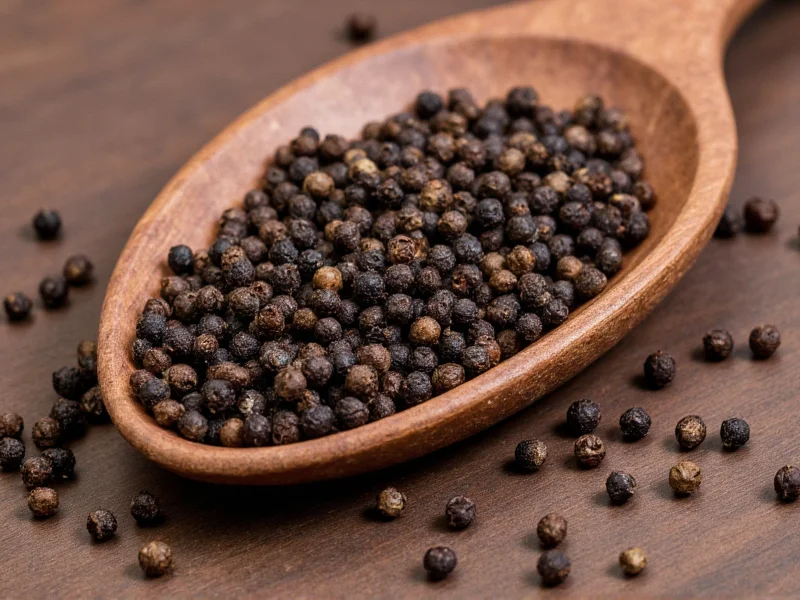When exploring is black pepper considered a spice, the answer extends beyond simple categorization to understanding what defines a spice in the first place. Unlike herbs, which come from the leafy parts of plants, spices originate from other plant components like seeds, roots, bark, or fruits. Black pepper specifically comes from the unripe fruit (berries) of the Piper nigrum vine, which are dried until they form the familiar wrinkled peppercorns.
What Makes Something a Spice?
The distinction between spices and other flavorings rests on three key factors:
| Classification Factor | Spice Characteristics | Black Pepper Example |
|---|---|---|
| Plant Origin | Non-leaf parts (seeds, roots, bark, fruits) | Fruit berries of Piper nigrum vine |
| Processing Method | Dried, fermented, or otherwise preserved | Berries dried until black and wrinkled |
| Flavor Profile | Strong, distinctive taste enhancing food | Pungent, sharp heat from piperine compound |
Black Pepper's Botanical Identity
Scientifically known as Piper nigrum, black pepper belongs to the Piperaceae family, completely separate from chili peppers (Capsicum family) that many confuse it with. The active compound responsible for black pepper's characteristic bite is piperine, not capsaicin which gives chili peppers their heat. This biochemical distinction explains why black pepper spice classification stands apart from hot peppers.
When harvested, black pepper berries undergo a specific processing method: they're briefly boiled then sun-dried for about a week. During this process, the outer layer ferments, turning black and developing the complex flavor profile that has made black pepper the world's most traded spice for millennia.
Historical Context: The King of Spices
Black pepper's status as a spice isn't merely modern classification—it has been recognized as such since ancient times. Historical records show:
- Ancient Romans valued black pepper so highly it was sometimes used as currency
- Medieval European traders paid exorbitant prices for "black gold" from Asian markets
- Viking explorers established early trade routes specifically for pepper
- Pepper was literally worth its weight in gold during certain historical periods
This historical significance cemented black pepper's identity as a spice long before modern botanical classification systems existed. Understanding why is black pepper called a spice requires appreciating both its historical context and scientific properties.
Black Pepper vs. Other "Peppers": Clearing the Confusion
One common source of confusion stems from the shared "pepper" name between black pepper and chili peppers. This linguistic overlap occurred when European explorers mistakenly identified New World chili peppers as relatives of the familiar black pepper.
The critical differences between these unrelated plants explain what makes black pepper a spice while chili peppers are technically fruits:
- Black pepper: Fruit of Piper nigrum (vine), contains piperine, classified as a spice
- Chili peppers: Fruits of Capsicum plants (bushes), contain capsaicin, classified as vegetables/fruits
- White pepper: Same plant as black pepper, but with outer layer removed, still a spice
- Pink pepper: Berries from a different plant (Schinus molle), also classified as a spice
Culinary Science of Black Pepper
The pungency of black pepper operates differently than chili heat. While capsaicin in chilies triggers heat receptors, piperine in black pepper stimulates different nerve endings, creating a sharper, more immediate sensation that dissipates faster. This unique property makes black pepper exceptionally versatile in cooking.
Professional chefs value black pepper not just for its heat, but for how it enhances other flavors through a phenomenon called "flavor synergy." Research shows piperine increases the bioavailability of other compounds in food, making black pepper one of the few spices that literally makes other ingredients taste better.
Common Misconceptions About Black Pepper
Several myths persist about black pepper's classification:
- Myth: "Black pepper isn't a 'real' spice because it doesn't come from a tree"
Fact: Spices can come from vines (like black pepper), roots (ginger), or flowers (saffron) - Myth: "Pepper is just a seasoning, not a true spice"
Fact: All spices are seasonings, but not all seasonings are spices—black pepper meets the botanical criteria - Myth: "Only hot things are spices"
Fact: Many spices like cinnamon, vanilla, and saffron aren't hot at all
Understanding these distinctions helps clarify why black pepper vs other spices comparisons often create unnecessary confusion. Black pepper's classification as a spice has never been in question within botanical or culinary science—it's only popular misunderstanding that sometimes creates doubt.
Practical Applications in Modern Cooking
Knowing that black pepper is indeed a spice informs how we use it effectively. Unlike salt, which primarily enhances existing flavors, black pepper actively transforms flavor profiles. The timing of when you add black pepper matters significantly:
- Raw applications: Freshly cracked pepper provides the most vibrant flavor in salads and finishing dishes
- Cooking process: Adding pepper early creates a mellower, integrated flavor
- Storage impact: Whole peppercorns retain flavor for years, while pre-ground pepper loses potency within months
For maximum flavor impact, culinary experts recommend grinding peppercorns immediately before use. The volatile oils that give black pepper its distinctive aroma begin dissipating within minutes of grinding, explaining why pre-ground pepper often seems less potent.











 浙公网安备
33010002000092号
浙公网安备
33010002000092号 浙B2-20120091-4
浙B2-20120091-4